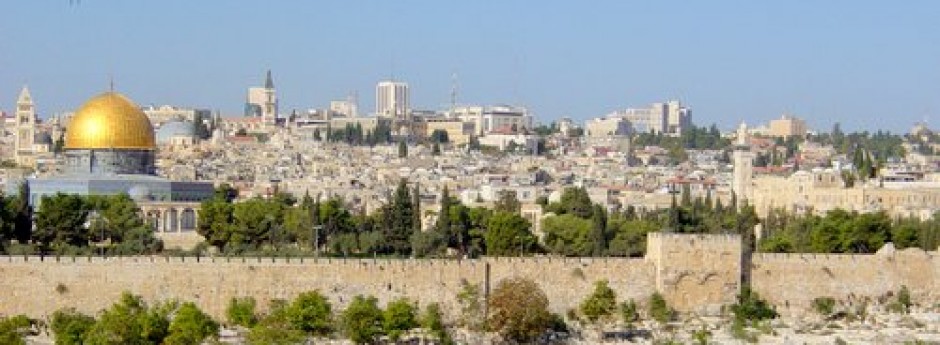Eliezer Ben-Yehuda at work
In the land of Israel today Hebrew is seen and heard everywhere. It is on the billboards, in the newspapers, on the store fronts and marquee. Hebrew is heard on radio and television, on the streets and buses and in the marketplaces. It is difficult to imagine that all this is part of a miracle which has happened largely in the last one hundred years. This miracle is the revival of Hebrew as a modern spoken language.
HOW THE MIRACLE OF HEBREW WAS ACCOMPLISHED
This great miracle was accomplished primarily through the efforts of one man, Eliezer Ben-Yehuda. When he came into the world the Jews spoke some seventy different languages, but they were unable to speak their own. In his day, Hebrew as a spoken language had been “dead” for almost two thousand years. Responding to what was apparently a vision from God this Russian Jew became obsessed with the thought of reviving Hebrew. With this in mind he moved to Israel in 1881. This was sixteen years before the First Zionist Congress and sixty-seven years before the founding of the State of Israel. When Eliezer arrived in Israel he changed his name from Eliezer Perlman to Eliezer Ben-Yehuda (son of Judea). He absolutely forbade his household to speak anything but Hebrew, for he was intent upon raising the first Hebrew speaking children in nearly two thousand years.
The resurrection of the Hebrew language proved to be a formidable task. Of course, the Hebrew Bible had been read by Jews over the centuries and Hebrew was used in some prayers, but it had not been used in conversation. It was therefore necessary for Eliezer to “create” thousands of modern words to make the language practical. It is said that even Theodore Herzl once objected to the use of Hebrew because there was no word for train. At this, Eliezer searched the ancient roots and came up with a new word, “rakevet” (root- to ride), which is commonly in use today.
Thousands of other words were necessary, like dictionary, newspaper, ice cream, and sidewalk. Eliezer diligently labored to supply all these from ancient Hebrew roots. In most cases he was successful, but on a few occasions his words simply never caught on. For instance, Eliezer’s word for telephone is still officially “sachrachok” (speaking from a distance), but the Israelis today insist on using the simple Greek form of “telephone.”
Eliezer labored on against all odds. He was branded a blasphemer by the Orthodox, he was dispossessed of his home, he was imprisoned by the Turkish Sultan and throughout his life he suffered from chronic tuberculosis. Yet almost single-handedly, he brought about the revival of Hebrew as a modern spoken language.
Some people feel all this is a fulfillment of Jeremiah 31:23: “When I bring them back from captivity, the people in the land of Judah and in its towns will once again use these words: ‘The LORD bless you, O righteous dwelling, O sacred mountain.’” Or of Zephaniah 3:9 “Then will I purify the lips of the peoples, that all of them may call on the name of the LORD and serve him shoulder to shoulder.” Whether these passages have veiled references to the revival of Hebrew, we cannot be sure. One thing is certain the revival of the language is a living daily miracle.
NEW IMMIGRANTS AND THE HEBREW LANGUAGE
One of the very first things that a new immigrant does upon arriving in Israel is to begin Hebrew studies. These Hebrew classes are known as ulpans. It is not unusual to have from twenty to thirty students in these classes, representing a cross section of all the major nations on earth. At the beginning of each language class, the students may scarcely be able to converse with each other. But after just a few weeks they can all talk together in Hebrew. What is even more important, because of God’s miracle and the diligent work of Eliezer Ben-Yehuda, these new immigrants can then open their ancient Hebrew scriptures and begin to read with virtually no difficulty. At the Israeli Museum in Jerusalem we have observed small school children reading the two-thousand year old Hebrew texts of the Dead Sea Scrolls.
What a miracle all of this is. Yet, we may wonder if God is content to restore Hebrew only to the Jewish people. In Christian ranks there also seems to be a renewed interest in the language. Many Christians have studied Hebrew in Iseraeli ulpans and others in home study groups. Universities and colleges are beginning to add Modern Hebrew to their curriculum, and there are some efforts to teach biblical and Modern Hebrew as a single course. In addition, Christians are now heard to sing songs like “El Saddai”, and to say words like “shalom.” It seems that God is even making the Hebrew words “Hallelujah” and “Amen” more popular than they used to be.
-Jim Gerrish
For further reading on the revival of Hebrew see:
Tongue of the Prophets, Robert St. John, Willshire Book Company.
The fascinating biography of Eliezer Ben Yehuda.
Hebrew the Eternal Language, William Chomsky, Jewish Publication Society.
Story of the Hebrew language, both spoken and written.
This updated article is presented courtesy of Bridges For Peace, Jerusalem (original publication date, 1985).
Picture credit, Wikimedia Commons.

